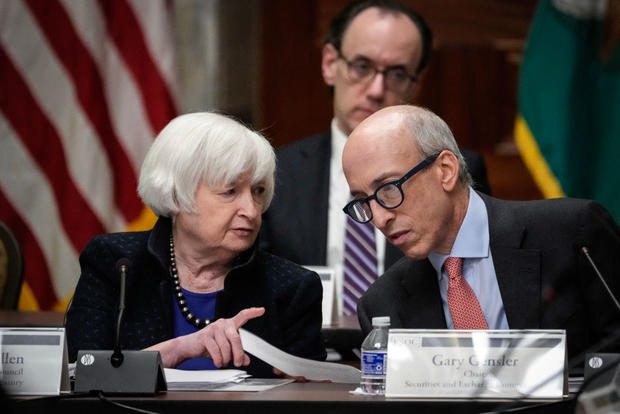TL;DR:
- Government report highlights AI as a potential threat to financial stability.
- The Financial Stability Oversight Council (FSOC) identifies 13 other risks in its annual report.
- Operational risks related to data controls, privacy, and cybersecurity are associated with AI.
- Concerns have been raised about AI’s challenges in explainability, bias, and accuracy.
- Recent AI-generated misinformation incident underscores the need for regulation and governance.
- Treasury Secretary Yellen emphasizes responsible AI innovation and risk management.
- The report provides a post-mortem analysis of Silicon Valley Bank’s collapse in March.
- Vulnerabilities in the commercial real estate sector are identified, with rising delinquency rates.
- Recommendations for addressing cybersecurity, climate change, and cryptocurrency risks.
- Calls for congressional legislation to regulate stablecoins and other cryptocurrencies.
Main AI News:
AI has been officially recognized as a potential threat to the stability of the nation’s financial system. The Financial Stability Oversight Council (FSOC), consisting of influential figures such as Treasury Secretary Janet Yellen, Federal Reserve Chair Jerome Powell, and Securities and Exchange Commission Chair Gary Gensler, outlined this risk in its recently released annual report.
The report underscores the operational risks associated with AI systems, emphasizing their reliance on extensive datasets and third-party vendors, which introduces concerns regarding data controls, privacy, and cybersecurity. The rapid proliferation of AI technology within the financial sector, primarily for pattern recognition, has drawn attention to the challenges of explainability, bias, and accuracy. Gensler, in particular, expressed reservations about AI’s potential to exacerbate financial fragility and its susceptibility to exploitation by malicious actors within financial markets.
A notable incident in May serves as a stark reminder of these concerns. An AI-generated image depicting a fake explosion near the Pentagon circulated on social media, triggering a brief sell-off in the stock market. Such incidents highlight the urgent need for comprehensive AI governance.
During the FSOC meeting, Yellen emphasized the increasing prevalence of AI and the necessity for prudent management of its adoption. She advocated for responsible innovation in the financial sector while stressing the importance of adhering to established principles and risk management protocols.
The report also conducts a thorough analysis of the March collapse of Silicon Valley Bank (SVB), the second-largest bank failure in U.S. history. The FDIC intervened on March 10, seizing SVB and New York-based Signature Bank, guaranteeing deposits after a massive $42 billion withdrawal by customers in a single day. Poor risk management, heavy reliance on uninsured deposits, and vulnerability to rising interest rates were identified as key factors contributing to SVB’s downfall. The Federal Reserve’s subsequent review revealed deficiencies in regulatory standards.
Moving forward, the FSOC recommends close monitoring of uninsured deposit levels and depositor composition by banking agencies. Despite prompt actions taken during the crisis, lingering vulnerabilities persist in the banking system.
Furthermore, the report sheds light on vulnerabilities in the commercial real estate sector, particularly among regional and community banks. Approximately $6 trillion in commercial real estate loans are outstanding, with half held by banks. Delinquency rates for loans backed by office properties have risen, exacerbated by persistently high office vacancies due to the ongoing pandemic. Refinancing risks loom large, primarily due to a significant number of maturities scheduled for 2024, potentially leading to financial instability if not addressed promptly.
The FSOC’s report also addresses other critical risks, including cybersecurity vulnerabilities, climate change, and cryptocurrencies. Cybersecurity risks are pervasive throughout the economy, necessitating enhanced cooperation between state and federal agencies, as well as private firms, to mitigate this growing threat. The council is developing a framework for identifying and assessing climate risks and emphasizes the importance of coordination between state and federal agencies in gathering essential data for monitoring climate-related financial risks. Additionally, the report recommends congressional legislation to regulate stablecoins and other cryptocurrencies due to their price volatility, recognizing the potential impact on financial stability.
Conclusion:
The recognition of AI as a financial stability risk and the report’s findings regarding vulnerabilities in the banking and real estate sectors underscore the critical need for comprehensive governance and risk management strategies in the financial industry. Market participants should prioritize responsible innovation and regulatory compliance to mitigate these emerging risks and ensure a resilient financial system.

